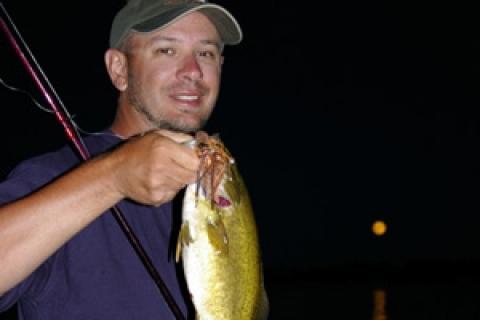
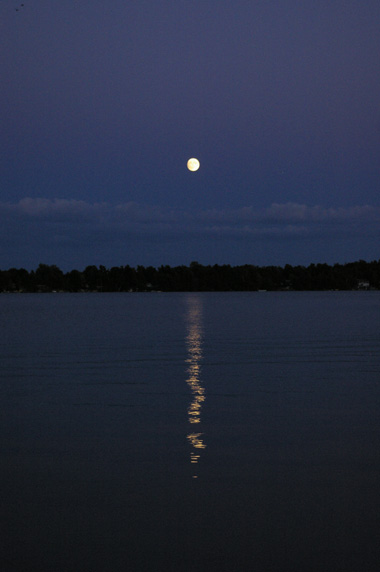
If you're looking to extend your fishing time and aren't afraid of the dark, working the night shift on your local lake can bring some eye-opening surprises. The fish can run thick while the crowds remain thin, leading you to some untapped angling possibilities and a new twist to the game of fishing.
The lake you choose will have a direct impact on your success at night and can also be a factor in your safety. Pick a lake that you are comfortable with and one you have fished in the past. Having a good knowledge of any given structure, as well as obstacles, is also well advised.
Make sure it is a body of water that routinely coughs up fish. If you can catch a bass at high noon on your favorite lake, you can certainly catch him at midnight.
High-pressured lakes are excellent nighttime spots. Although the influx of anglers may turn the fish off during the day, they will be more prone to actively feed once the sun goes down, giving you access to untapped angling possibilities.
Choose a lake that has close access points to the areas you intend to fish. Launch ramps that leave only a short run to the fish are best, especially for the ease and safety they provide.
Clear-water is preferred over dirty or stained, as this will increase the likelihood of fish locating your lure. Bass have excellent low-light vision, and extra bites can be had when working water that they can more easily see through.
Weather conditions can also play an important part in your decision-making. The most productive nights usually occur after a hot, sunny and calm day. The full moon period also sees an increase in fish activity and gives anglers a bit of an edge by increasing their own visibility.
Where to Fish During the Night
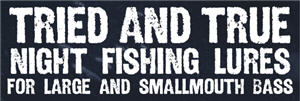 |
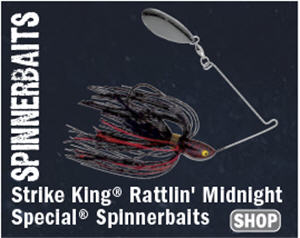 |
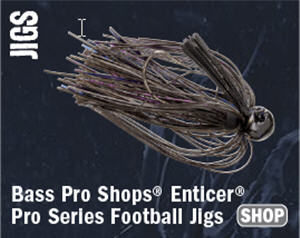 |
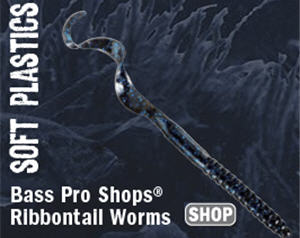 |
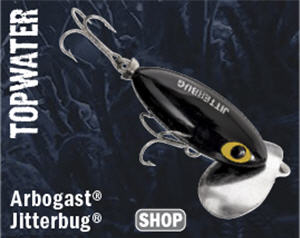 |
Fish will often lurk in typical "day spots" during the night, although, they may move up to shallower water. Weed and sand flats are great choices for bass, walleye, pike and muskie, especially if the vegetation has open areas and passages. Stay away from heavily vegetated spots, as these will often hold less fish while also snagging more lures. Depths will vary from lake to lake, but 10 feet or less is often a good starting point.
Rock points will often cough up walleye, muskie and pike, especially if they are close to deep water. Fish will move up here to feed at night, and will be more tempted if the area has a mixture of weeds, rock and sand.
Docks are a great location to find largemouth bass. Smaller fish are attracted to the lighted structures, ultimately bringing the larger predators in. Don't forget to work the channels surrounding docks, as this is a prime cruising lane for bass to feed in.
Rip-rap and rock shoals hold tremendous potential for smallmouth bass, as these areas are an excellent hangout for crawfish. Walleye and muskie will also key in on the hard stuff, especially when a bit of wood or weed is thrown into the mix.
Humps will generally hold all types of fish. Locate those with a shallow feeding shelf that borders deep water, and you may hit a gold mine.
Fishing Lures for the Night
No matter what specie you plan to target, there are a few simple rules for selecting fishing baits. Offering the fish a silhouette at night is your best bet for getting a strike. Since the sky will be lighter than the water, the color black will be most visible, and is a nighttime standard when it comes to fishing.
Sound is also important at night, as fish use their inner ears and lateral line to detect motion and disturbances. Noisy topwaters, rattling crankbaits, and flipping jigs or worms with sound chambers will allow fish to key in on baits more easily.
Scent also comes into play, and all slow-moving baits (jigs, worms etc.) should get a healthy dose of a commercial scent product. This will help fish detect baits, as well as hold on to them for longer periods of time.
The following list represents some tried and true baits for fishing at night:
| Bass (largemouth and smallmouth) |
Walleye | Musky/Pike |
|
Livebait |
Bucktails Spinners Topwaters Large jigs |
Equipment for night fishing is fairly standard. Baitcast or heavy spinning gear will get the job done, as finesse and light-line tactics are not necessary. Sensitive fishing rods work well at night, enabling an angler to feel the movement of their lure, as well as subtle strikes. Ensure that fishing reels are smooth and drags set correctly, as darkness is not the environment you want for gear failure.
Mono or braid both work well, although many rely on fluorescent line for the characteristics it holds. When used in conjunction with a black light, fluorescent line will give off a bright glow, enabling an angler to watch for strikes or pickups, see where their lure is and better work a retrieve — an excellent option for the beginner or advanced night fisherman.
When fishing at night, weighing down the boat with excess rods and tackle is not necessary. Take three rod and reel combos and a tackle tray or two. This will simplify things and leave one less obstacle to trip over when moving in the boat at night.
Night Fishing Safety
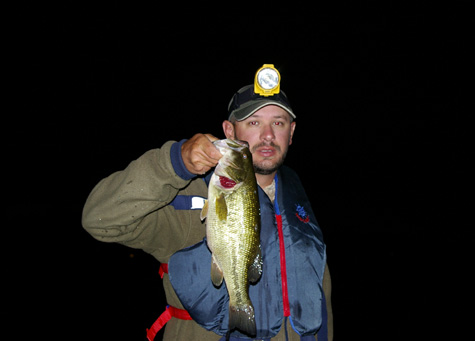 |
| The author shows the rewards of another successful night. |
Fishing at night is a fun and enjoyable sport, but as in all aspects of angling, accidents can happen. A cold lake shrouded in darkness is one place you don't want accidents to occur.
Planning and foresight can go a long way. Religiously make a checklist before heading out, and always ensure that gear and safety equipment is in proper working order. The following list represents some good advice for minimizing the risks:
- Always let someone know where you are fishing and when you will be home. If possible, fish with a partner.
- Launch your boat as close as possible to the areas you intend to fish.
- Ensure that boat running lights are working, and keep them on at all times.
- Take a fully charged cell phone.
- Wear a life jacket.
- Keep a search spotlight on board, as well as two flashlights and a headlamp.
- A landing net and long-nosed pliers should always be on deck.
- A GPS unit can help you find the launch in bad weather, or if you get disorientated. A compass can be invaluable if a GPS unit is not available.
- Whistle and flares work well for attracting attention.
- Orientate yourself with the water during daylight hours before venturing out at night.
- Stick close to shore until you feel comfortable and capable.
- Bring bug repellent and a first-aid kit.
- Check weather forecasts before heading out.
Fishing at night can be a great experience. It certainly adds a new element to angling and can put you on a ton of untapped fish. Give it a go this season and see all the action you've been missing!
- 14376 views

